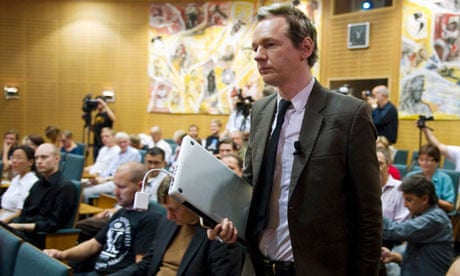Swedish prosecutors say they hope to announce today whether they will pursue two cases of alleged sexual assault involving Julian Assange, the founder of WikiLeaks.
Prosecutors say they are considering a complaint of sexual molestation from one woman, Ms A, who has previously been an active supporter of Assange. They say they are also still considering whether any offence may have been committed against a woman known as Ms W, who met Assange at a seminar in Stockholm this month, and who originally alleged rape, a charge which was soon dropped. Assange has emphatically denied committing any offence against either woman.
In a case mired in conflicting claims, only a few essential events are clear:
On Friday last week, Ms A and Ms W together approached police in Stockholm and reported that they had been sexually assaulted by Assange.
Both women reported that they had been involved in consensual sexual relationships with Assange, but each reported a separate non-consensual incident of a similar character in which Assange allegedly had sex with them without using a condom.
Both alleged incidents were very recent. The alleged molestation of Ms A was said to have occurred on the morning of Saturday 14 August. The alleged rape of Ms W was said to have occurred on the morning of Tuesday 17 August.
The Swedish police passed a report to prosecutors, who issued a formal warrant for Assange's arrest on suspicion of rape. On the following day, the charge of rape was dropped and the warrant was rescinded.
It is understood that before going to the police, both women asked Assange to have a health check to reassure them, and that Assange declined to do so. Ms W is said to have visited a hospital on Thursday before going to the police.
One source who is closely involved said neither of them had originally wanted the case prosecuted; that Ms W had wanted to report the alleged rape to police without their pursuing it, and that Ms A had gone with her to give her moral support and then become embroiled with the police, who had insisted on passing a report to prosecutors. Neither the police nor the prosecutor has spoken to Assange to record his version of events. The fact that a warrant had been issued for his arrest was rapidly leaked to a Swedish newspaper.
It remains unclear why the prosecutor first issued and then withdrew the arrest warrant. The prosecutor's office has said that the original issuing of the warrant was not a mistake, and that it was cancelled when it received new information.
The chief prosecutor, Eva Finne, yesterdayyesterday told the Guardian: "I will analyse this matter thoroughly and make all necessary legal judgements, to be able to decide on the progress of the investigation. My estimation is that I can give information later this week, probably tomorrow." Ms A spoke at the weekend to the Swedish newspaper Aftonbladet and said she was not frightened of Assange and that he was not violent. She said she had only ever alleged sexual molestation, not rape, and added: "In both cases, what started out as voluntary sex subsequently developed into an assault. The other woman wanted to report rape. I gave my story as testimony to her story and to support her. We stand by the information."
In a weekend interview with the same paper, for which he is due to become a regular columnist, Assange said: "I never, neither in Sweden nor in any other country, had sex with someone in a way that is not built on total consent from both sides." He said nobody had asked him for his side of the story but that he needed to know more about the accusations before he could discuss them in any detail.
In subsequent tweets and interviews, Assange suggested that the timing of the allegations against him was "deeply disturbing". He told al-Jazeera on Sunday: "It is clearly a smear campaign … The only question is who was involved. We can have some suspicions about who would benefit, but without direct evidence, I would not be willing to make a direct allegation." He said he had been warned that the US Pentagon was planning to use dirty tricks to spoil things for WikiLeaks.
In her interview with Aftonbladet, Ms A said: "The charges against Assange are, of course, not orchestrated by the Pentagon. The responsibility for what happened to me and the other girl lies with a man who has a twisted attitude to women and a problem with taking 'no' for an answer."
Assange attracted global attention last month when he posted a database of US military records from Afghanistan on the WikiLeaks website. The Guardian, the New York Times and Der Spiegel published stories which were based on the records. US military authorities were highly critical of Assange's actions.
